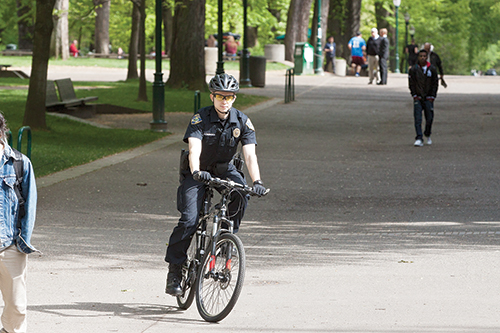With warmer weather in full swing, Portland State students and faculty will be seeing more Campus Public Safety Office officers out patrolling—but not in patrol cars as they might expect.
CPSO increases bike patrols on campus

With warmer weather in full swing, Portland State students and faculty will be seeing more Campus Public Safety Office officers out patrolling—but not in patrol cars as they might expect.
The officers, even CPSO Chief Phil Zerzan, will be increasing their patrols of campus on bicycles.
PSU has had CPSO officers patrol on bikes for many years, and this year Zerzan is trying to increase the time officers spend patrolling on bikes versus in patrol cars.
“[Patrolling on bicycles] is more efficient, it’s friendlier, [it’s] more effective and it’s a sustainable practice,” Zerzan said. “You can hear what is going on around you better and you can get to calls faster.”
Bicycle patrols can have their limitations, though, Zerzan said.
“It’s pretty hard to take someone to jail on a bicycle,” he joked.
Five of CPSO’s officers were already certified to do bike patrols through the Law Enforcement Bicycle Association, and eight more went through the training this year. CPSO Patrol Sgt. Joe Schilling helped create the LEBA course and is a certified instructor. Schilling instructed the course this year.
Patrol Officer Jon Buck, who will have been with CPSO for six months in May, went through the course for the first time this year and found it very enjoyable.
“I hadn’t ridden a bike since the eighth grade, or maybe my freshman year of high school, and 90 percent of this course is spent on the bike, learning the unique concerns you have to be aware of when doing a bike patrol,” Buck said.
Some of these concerns are emergency braking, tactical positioning of the bike on stops and contacts with the public, defensive positioning of the bike and maintaining the bike and its equipment.
Patrolling on a bike increases speed, maneuverability, stealth and community visibility that isn’t possible in a patrol car, Buck said.
“There is a difference in contacting people on a bike versus in a patrol car. There’s less tension, people are more comfortable approaching you and are more at ease in their interaction with you than they are if you’re in a patrol car,” he said.
“Increasing our visibility in the community and being more approachable is a very important aspect of bike patrols,” Zerzan said.
Zerzan is also trained in the LEBA course and said students can absolutely count on seeing him doing bike patrols along with the other officers this spring.






